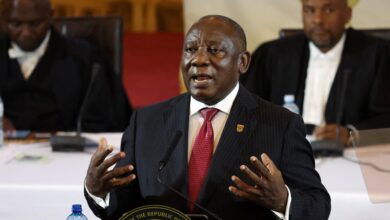
A United States security bill that would curtail funding to the United Nations agency for Palestinian refugees is raising alarm, as rights advocates say a years-long effort to dismantle the agency is gaining steam amid Israel’s war on Gaza.
The proposed $118bn legislation, a draft of which (PDF) was blocked in the US Senate on Wednesday, includes a provision prohibiting Washington from allocating any funds to the United Nations Relief and Works Agency (UNRWA).
Seth Binder, advocacy director at the Middle East Democracy Center, said this would apply to humanitarian assistance included in the bill as well as any previously approved funds for UNRWA that have not yet been allocated, a sum totalling about $300,000.
“It’s unclear … where and how this specific provision may become law, if it ever is able to,” Binder told Al Jazeera. “But it is concerning nonetheless just given recent developments.”
UNRWA came under renewed scrutiny last month after the Israeli government accused around a dozen of the agency’s more than 13,000 Gaza employees of taking part in Hamas’s attack on southern Israel on October 7, which killed a reported 1,139 people.
UNRWA immediately sacked the employees in question and announced that it was opening a probe into the allegations, which it described as “shocking” and “serious”. UN Secretary-General Antonio Guterres also has appointed an independent panel to investigate.
Israel has yet to provide evidence to back up its allegations, but the US and several other countries quickly suspended funding to the agency as a result. UNRWA relies on government contributions to fund its operations in the occupied Palestinian territories, Jordan, Syria and Lebanon.
Against that backdrop, the Senate bill — which had the support of President Joe Biden — reflected growing bipartisan acceptance of what previously were Republican-driven attempts to curtail UNRWA, said Ethan Mayer-Rich at the Arab Center Washington DC.
“We’re seeing a pretty quick departure from what used to be a split down party lines,” he told Al Jazeera. “It’s reckless, and ultimately I think history is going to see [the US] as being completely complicit in what is unquestionably an incredibly tragic and dire situation.”
Mayer-Rich, the centre’s liaison for US government affairs, added that “the conversation in part is guided by the Biden administration”.
“We’ve seen, at this point, an endorsement by the highest level of office that it’s OK for Democrats to call into question UNRWA’s mandate, to call into question the necessity of its mission, which has long been a Republican-guided effort,” he said.
“This is a message that will have a durable impact on the way that Democrats are talking about UNRWA and the necessary services it provides.”

‘A huge hole’
Indeed, current attempts in the US to defund UNRWA come at a critical time.
The agency is leading humanitarian aid efforts in Gaza, where Israel’s military bombardment has killed more than 27,708 Palestinians and caused wide-scale destruction since October 7.
Palestinians in the besieged enclave also face dire food, water and medical shortages. The local healthcare system is near total collapse, and more than 1.7 million people have been internally displaced. Many families have sought shelter at UNRWA-run facilities.
Since the Biden administration announced its UNRWA funding freeze in late January, top UN officials — as well as human rights advocates and humanitarian aid groups — have issued multiple pleas asking Washington to reconsider.
The US previously provided $422m to the agency in 2023, making it UNRWA’s largest contributor. Those funds accounted for nearly 30 percent of UNRWA’s contributions last year, explained Bill Deere, director of the agency’s Washington representative office.
“If this proposal were to become law, that’s a huge hole that would have to be filled,” Deere told Al Jazeera in an email, referring to the Senate bill.
The legislation, which included more than $14bn in additional US security assistance to Israel, had the backing of the White House, but it is unlikely to reach Biden’s desk to be signed into law, particularly after Wednesday’s setback in the Senate.
Top Republicans have also said it will be “dead on arrival” if it reaches the House of Representatives, amid calls for stricter immigration measures.
Still, Deere — who described the atmosphere in Washington as a “challenging policy environment” — said the bill “demonstrates that we need to keep discussing with lawmakers the fact that UNRWA and the UN have acted swiftly and decisively in the wake of the recent news”.
He also warned that the agency “will have a very hard time operating beyond March 1st if donor states do not resume their support” and stressed that UNRWA operates beyond Gaza alone.
“Hundreds of thousands of Palestine refugees in the West Bank, Lebanon, Syria and Jordan will lose access to primary healthcare, direct food support, rental assistance, and education,” Deere said. “Human decency aside, such an occurrence also poses a regional stability issue.”
Reinvigorated pressure
But despite those warnings, Republicans have seized on the accusations against UNRWA to reinvigorate a years-long effort to stymie the agency. “This is something that they’ve long been trying to do, and they’ve really seized the moment,” said Mayer-Rich.
At least seven pieces of legislation aimed at defunding or disbanding UNRWA have been introduced by the Republicans in Congress since Israel’s allegations were made public, according to a tally by the Arab Center Washington DC.
Republican legislators held a subcommittee hearing last week titled, “UNRWA Exposed: Examining the Agency’s Mission and Failures”.
And a group of nearly two dozen Republican senators had called for legislation to include “an immediate and permanent prohibition” on US assistance to UNRWA. “The United States must permanently stop all contributions to UNRWA,” they said (PDF) on January 31.
The push comes less than six years after former Republican President Donald Trump ended US assistance to the agency in 2018, saying that Washington was shouldering a “very disproportionate share of the burden of UNRWA’s costs”.
That move — widely seen as part of the Trump administration’s hardline, pro-Israel stance — crippled UNRWA’s operations. Biden restored funding in 2021.
Tariq Kenney-Shawa, US policy fellow at Palestinian think tank Al-Shabaka, said Israel and its allies in the US have attacked UNRWA for decades in an effort to weaken the right of Palestinian refugees to return to what is now Israel, a long-standing demand.
“What Republicans would like to see is a dismantling and defunding of UNRWA so that the Palestinian refugee ‘problem’ can fade into the annals of history,” he told Al Jazeera.
While Republicans have historically been the “loudest voices” pressuring UNRWA, Kenney-Shawa explained that staunch support for Israel in the US is bipartisan. Some establishment Democrats last month quickly called to cut funding to the agency, too, following the recent allegations.
He also noted the timing of the accusations against UNRWA and the US funding cut, just hours after the International Court of Justice determined on January 26 that Israel was “plausibly” committing genocide against Palestinians in Gaza.
“Representatives of the [Biden] administration have themselves emphasised the critical role that UNRWA plays in providing aid and support for Palestinian refugees and Palestinians in need,” Kenney-Shawa said.
“But at the same time, I think their larger concern is providing cover for Israel at any cost — and I think that cost is Palestinian refugees and is UNRWA.”
US to ‘redirect’ funding
Though the Senate bill is unlikely to pass in its current form, the UNRWA provision continues to raise alarm.
The US State Department acknowledged this week that the Biden administration is looking into other ways to support humanitarian efforts in Gaza because the legislation contains language that would block its ability to fund the agency.
Spokesman Vedant Patel told reporters on Monday that Washington plans to “redirect funding for UNRWA to other partners to provide assistance in Gaza”, including to the United Nations Children’s Fund (UNICEF) and the World Food Programme (WFP).
The Senate bill included $1.4bn of humanitarian assistance for Gaza, Patel said. “This is tangible money that we believe will save lives and have a direct impact on Palestinian civilians.”

However, the leaders of several UN agencies — including UNICEF and the WFP — said last week that suspending funds for UNRWA would have “catastrophic consequences” because “no other entity has the capacity to deliver” what is needed in Gaza.
The International Rescue Committee and other humanitarian groups also said, “UNRWA’s humanitarian role in this crisis is indispensable and cannot remotely be replaced by any other aid organization”.
According to Kenney-Shawa, the future of UNRWA funding in the US right now largely hinges on the political will of the Biden administration and the Democratic Party.
“If the Biden administration is truly committed to the provision of humanitarian aid to the Palestinians, like they on paper say they are, then there are avenues to push back against Republicans and make sure there is no provision within these proposed bills that automatically just cuts funding outright,” he said.
But that appears unlikely, Kenney-Shawa explained, because it would mean standing up to Republicans and pro-Israel lobby groups in an election year — and possibly appearing to challenge Israel.
“I think the Republicans are, as always, … seizing the opportunity to kind of put the Biden administration between a rock and a hard place, knowing full well that, at the end of the day, the Biden administration is going to side with Israel.”
Source link




